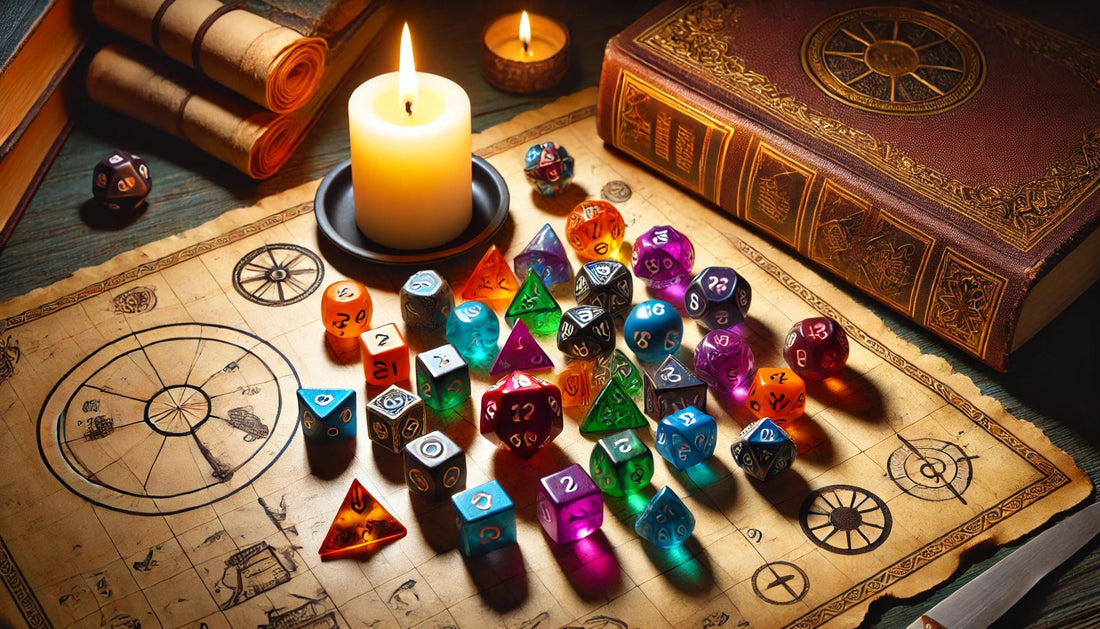
RPG Dice: Unlocking the Mysteries of Those Enigmatic Numbers
Share
Once upon a time in the enchanting realm of tabletop gaming, a myriad of polyhedral dice lay nestled in velvet pouches, waiting to spring to life in the hands of eager adventurers. These dice, with their many faces and cryptic numbers, hold the keys to countless stories, battles, and quests. But for the uninitiated, these polyhedral wonders can seem as mysterious as a dragon's hoard. Fear not, brave reader! Join us as we embark on a journey to decipher the magic of RPG dice and unravel the secrets behind their enigmatic numbers.
The Origins of Polyhedral Dice
Our tale begins in ancient times, where civilizations like the Egyptians, Greeks, and Romans used early forms of dice for gaming and divination. Fast forward to the 1970s, a wizard named Gary Gygax conjured "Dungeons & Dragons," and the iconic polyhedral dice were reborn, forever changing the landscape of role-playing games (RPGs). These dice come in various shapes, each known by a mystical name derived from their number of sides.
Meet the Cast: Types of Polyhedral Dice
- The D4 (Tetrahedron): A pyramid-shaped die with four triangular faces. It's often used for determining small amounts of damage or minor spell effects. Its sides are numbered 1 to 4, but unlike other dice, you read the number at the base of the pyramid.
- The D6 (Cube): The most familiar of all, this six-sided die is a staple in many games. It’s perfect for weapon damage, attribute checks, and anything that requires a straightforward outcome from 1 to 6.
- The D8 (Octahedron): With eight triangular faces, the D8 is commonly used for moderate damage rolls and certain spell effects. Each face is numbered from 1 to 8, providing a broader range of possibilities.
- The D10 (Pentagonal Trapezohedron): This ten-sided die is a bit of a trickster, often used in percentile rolls when paired with another D10. It’s numbered 0 to 9, where 0 typically represents 10.
- The D12 (Dodecahedron): Rare and majestic, the twelve-sided D12 is usually reserved for powerful attacks and potent spells. Each face is numbered from 1 to 12.
- The D20 (Icosahedron): The king of polyhedral dice, with twenty triangular faces. The D20 is central to many RPG mechanics, particularly in "Dungeons & Dragons," where it determines success or failure in combat, skill checks, and saving throws.
- The D100 (Zocchihedron): Also known as the percentile die, this hundred-sided behemoth is typically replaced by two D10s in modern play. It’s used for particularly detailed percentage-based outcomes.
The Language of Numbers: Interpreting Dice Rolls
Understanding what the numbers mean when the dice hit the table is crucial to mastering any RPG. Here’s a glimpse into how these numbers weave the fabric of your adventures:
- Attack Rolls: Often involving a D20, this roll determines whether an attack hits its target. The result is compared to the target's armor class (AC). Rolling high means success, while a low roll may spell trouble.
- Damage Rolls: Once an attack hits, other dice like the D6, D8, or D12 come into play to calculate the damage dealt. The result can be modified by various factors like strength or magical enhancements.
- Skill Checks: When characters attempt actions like picking a lock or deciphering ancient texts, they roll a D20, adding their skill modifiers to the result. A higher total indicates better success.
- Saving Throws: To resist spells or avoid traps, characters roll a D20 and add their relevant saving throw modifiers. Success can mean avoiding harm entirely, while failure may result in dire consequences.
The Dance of Probability: Why Dice Matter
The numbers on RPG dice aren't just random—they're governed by the laws of probability. Understanding these laws can elevate your gameplay, making you a more strategic player.
- Average Rolls: Each type of die has an average roll value, calculated as (highest number + lowest number) / 2. For example, the average roll of a D6 is 3.5.
- Modifiers: Adding or subtracting numbers from your roll affects your probability of success. For instance, a +5 modifier on a D20 roll can significantly increase your chances of hitting high AC targets.
The Magic of Critical Rolls
Ah, the thrill of rolling a natural 20 or the despair of a natural 1! In many RPGs, a natural 20 on a D20 roll is an automatic success, often with extra benefits, while a natural 1 is a catastrophic failure, sometimes with humorous or disastrous outcomes. These critical rolls add a layer of unpredictability and excitement to the game.
The Art of Dice Etiquette
In the realm of RPGs, how you roll your dice can be as important as the roll itself. Here are some unwritten rules of dice etiquette:
- Roll Where Everyone Can See: Transparency ensures fair play and builds trust among players.
- Respect the Dice: Superstitions abound, from never letting others touch your dice to believing in “lucky” dice. Whether these beliefs hold true or not, respecting them can enhance the communal spirit of the game.
- Celebrate and Commiserate: High rolls and critical successes are cause for celebration, while low rolls and critical failures deserve sympathy. Sharing these moments strengthens the bond among players.
The Role of Dice in Storytelling
Dice rolls are more than just numbers—they’re the heartbeat of the story. Each roll can turn the tide of battle, unlock a crucial secret, or spell doom for an adventuring party. The unpredictability of dice ensures that every game session is unique, filled with surprises and memorable moments.
Conclusion: Embrace the Chaos
RPG dice are the magical tools that transform numbers into epic tales of heroism, cunning, and adventure. By understanding the meanings behind those numbers and the mechanics they govern, you become a master of your own destiny. So gather your dice, embrace the chaos, and let the numbers guide you to your next great adventure!
As we conclude our journey through the realm of RPG dice, may your rolls be ever in your favor, and may the stories you create be legendary. Until next time, fellow adventurers, keep those dice rolling and the imagination soaring!
